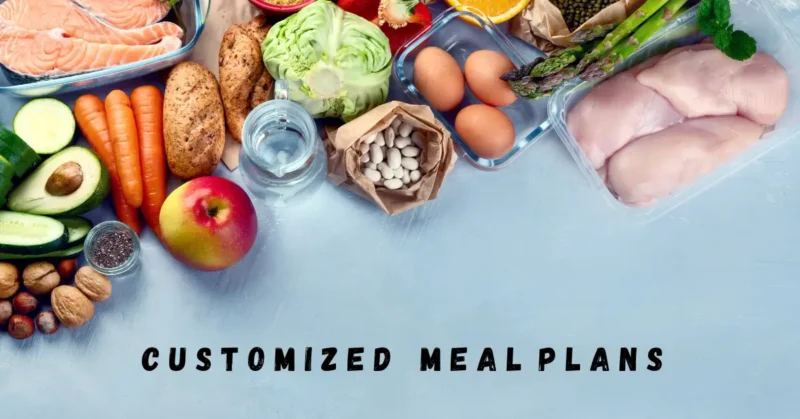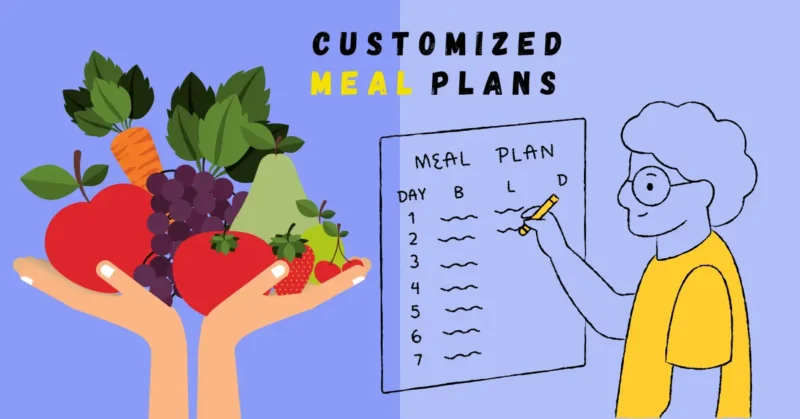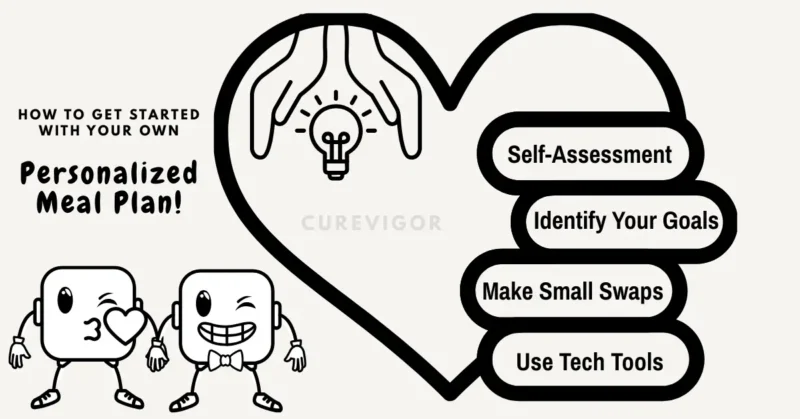Generic diets fail because they ignore your unique needs. See how customized meal plans deliver lasting results with flexibility, and guided personalization.
Thank you for reading this post, don't forget to subscribe!Learn how personalized nutrition beats one-size-fits-all diets for sustainable weight loss and long-term success. Most popular diets frustrate because they lack flexibility and personalization.
Customized Meal Plans: The Key to Sustainable Health and Weight Loss
Most of us have tried a trendy diet—keto, paleo, intermittent fasting—only to end up frustrated, hungry, and back where we started. The problem isn’t willpower; it’s the diet. Generic, one-size-fits-all diets overlook individual differences, which is why they often fail to meet their goals.

Customized meal plans, on the other hand, are built around your unique needs, preferences, and goals. They’re not about restriction—they’re about sustainability. Compared to rigid diets, personalized nutrition offers a more innovative and long-term approach to achieving balance in health, performance, and lifestyle.
The Inherent Flaws of One-Size-Fits-All Diets
Why do most popular diets set you up for frustration? The answer lies in their lack of flexibility and personalization.
Why Don’t Generic Diets Work for Everyone?
Imagine wearing a suit tailored for someone else. It might fit, but it never feels right. Generic diets are the same.
- They Ignore Biological Uniqueness: A single diet cannot account for individual differences in metabolism, genetics, gut microbiome, age, gender, and activity level. A study published in Cell demonstrated that people have vastly different blood sugar responses to the same food, suggesting that universal dietary recommendations are inherently limited.
- They Overlook Diverse Goals: A diet designed for rapid weight loss is useless for an athlete trying to build muscle. It won’t help someone manage diabetes or navigate food allergies. Generic diets fail to address these specific, individual objectives.
The Psychological Strain of Rigid Dieting
Beyond the physical mismatch, the psychology of restrictive dieting is a recipe for burnout.
- The Deprivation Cycle: Restrictive rules and low calories cause strong cravings. When you “cheat,” guilt often follows, leading many to quit the diet.
- A Negative Food Relationship: These diets often foster a “good food vs. bad food” mentality, causing anxiety and an unhealthy relationship with eating.
The Key Benefits of Customized Meal Plans
Personalized nutrition shifts away from restrictive rules and toward a tailored, evidence-based approach. It’s not a diet; it’s a framework for eating designed exclusively for you.
Tailored to You: The Core of Effectiveness
The power of a bespoke meal plan lies in its specificity.
- Personalized Nutrition in Action: Your plan is tailored to your unique metrics, including caloric needs, macronutrient splits (protein, carbs, fats), food preferences, allergies, intolerances, cooking skills, and budget.
- Managing Health Conditions: Unlike generic plans, a customized approach can be specifically designed to manage health issues such as diabetes, PCOS, high cholesterol, or IBS, often in consultation with a doctor or a dietitian.
How to Develop Customized Meal Plans: DIY vs. Professional Help

The DIY Approach: Steps to Personalize Your Own Diet
If hiring a nutritionist isn’t an option, you can still take steps to personalize your diet:
- Track your food and energy levels for a week to spot patterns.
- Set realistic goals (e.g., gradual weight loss, more energy, improved digestion).
- Balance macronutrients—include protein, healthy fats, and complex carbs.
- Adjust portions and food choices based on how your body responds.
While DIY can be effective, it requires thorough research, consistency, and a willingness to experiment.
Working with a Pro: What a Nutritionist Really Does
A nutrition professional takes personalization to the next level. The process usually includes:
- Comprehensive assessment: reviewing health history, lifestyle, and dietary habits.
- Goal setting: defining clear, achievable outcomes together.
- Plan creation: providing specific meal ideas, recipes, and shopping guidance to help you plan your meals effectively.
- Education: teaching principles like portion control and macronutrient balance.
- Ongoing support: making adjustments as your body and goals evolve.
Expert guidance makes customized meal plans more effective and sustainable than trial and error.
The Evidence: What Science Says About Personalized Nutrition
This isn’t just theory; it’s a growing scientific field.
A landmark study, the PREDICT project, found that individual responses to the same foods are unique. Their research showed that “personalized diets created with gut microbiome and other personal data led to better health outcomes than standard advice.”
Expert Insight: Registered Dietitians often state, “We’ve known for years that the ‘perfect diet’ doesn’t exist. The future of nutrition is personalization—utilizing individual data to create eating patterns tailored to a person’s specific physiology and lifestyle.
This is how we build sustainable health, not quick fixes.”
Research and Studies Supporting Customized Meal Plans
Recent studies have shown that diets tailored to individual metabolism improve weight loss and overall health more effectively than standardized diets. Personalized nutrition is becoming the gold standard in the field of science.
Jane Smith notes, “When nutrition is personalized, clients see better results because the plan fits their lifestyle and biology—not the other way around.”
Real-World Success Story
Sarah, 35, struggled with weight cycling. With a nutritionist’s customized plan, she lost 20 pounds in six months and has maintained her weight loss for two years—unlike with generic diets.
How to Get Started with Your Own Customized Meal Plan

Ready to move beyond the generic? Take the next step—start your personalized meal plan today and commit to lasting health.
The DIY Approach: Steps to Personalize Your Diet
- Self-Assessment: Track your food intake honestly for 3-5 days. Note not just what you eat, but how it makes you feel—energized, sluggish, bloated?
- Identify Your Goals: Be specific. Instead of “lose weight,” try “lose 10 pounds in 3 months to have more energy for my kids.”
- Make Small Swaps: Based on your assessment, identify one area for improvement. Swap a sugary snack for a piece of fruit. Add one more vegetable to your dinner.
- Use Tech Tools: Apps like EatLove or PlateJoy can generate meal plans based on your preferences and goals, offering an excellent bridge between fully generic and working with a pro.
Working with a Professional: The Gold Standard
For the best results, especially with specific health concerns, consulting a Registered Dietitian (RD) or a certified nutritionist is invaluable. Here’s what the process looks like:
- Comprehensive Assessment: They will conduct a detailed evaluation of your health history, current habits, lifestyle, and goals.
- Plan Development: They will create a tailored plan for you, often with recipes, meal ideas, and nutritional guidance.
- Ongoing Support and Adjustment: This is the key! They provide continuous support, answer questions, and adjust your plan as your life and goals evolve, ensuring you stay motivated and on track.
FAQs
Q. Is it better to eat smaller meals or one big meal?
The answer depends on your lifestyle, metabolism, and goals. Some people feel energized and satisfied eating 3–5 smaller meals spread throughout the day, which helps stabilize blood sugar and curb cravings. Others do well with fewer, larger meals, especially if they practice intermittent fasting.
What matters most is consistency and how your body responds to it. Smaller meals may be helpful for those with digestive issues or blood sugar concerns, while bigger meals can fit people with busy schedules.
Instead of following a one-size-fits-all rule, track how each style affects your energy, hunger, and performance. A customized meal plan can help you find the right balance.
Q. What are the benefits of personalized diets?
Personalized diets cater to your unique needs, rather than forcing you into a rigid template. They can help improve energy levels, support weight management, and address health conditions such as high cholesterol or food intolerances. By tailoring meals to your tastes, lifestyle, and goals, you’re more likely to stick with them long-term.
Flexibility is another advantage—you can adapt the plan as your needs change. Unlike generic diets, personalized nutrition fosters a healthy relationship with food, rather than one marked by guilt or restriction. The result is a more sustainable approach to eating that fits your real life.
Q. Why is it essential to customize nutrition plans for individuals with special dietary needs?
People with conditions like diabetes, PCOS, celiac disease, or food allergies require specific dietary considerations. A generic diet may overlook these needs, potentially exacerbating symptoms or compromising health.
Customizing a nutrition plan ensures safety, effectiveness, and improved quality of life. It allows for proper nutrient intake while avoiding trigger foods or harmful patterns.
Personalized plans also make it easier to balance medical requirements with enjoyable meals, so eating doesn’t feel like a burden.
With the proper adjustments, individuals can achieve better health outcomes and maintain long-term success.
Q. Why are diet plans personalized?
Diet plans are personalized because no two people are alike. Factors such as metabolism, genetics, activity level, health history, and goals all influence how your body responds to food.
A plan tailored to these details is more effective than a generic one because it aligns with your biology and lifestyle. Personalization also increases adherence—when meals match your preferences, you’re more likely to stick with them.
This approach reduces frustration and helps build sustainable habits, rather than relying on short-term fixes. Ultimately, personalized diets yield better results because they are tailored to the individual.
Conclusion: Ditch the Diet, Embrace Personalization
The era of frustrating, one-size-fits-all diets is over. The evidence is clear: sustainable health results don’t come from following rigid, external rules. They come from a personalized approach that honors your individuality.
Generic diets fail because they ignore who you are. Customized meal plans succeed because they start with you. They are flexible, educational, and designed for real life, fostering a positive relationship with food that lasts a lifetime.
One-size-fits-all diets fail because they lack personalization and sustainability. Customized meal plans succeed by tailoring nutrition to the individual, offering flexibility, and creating habits that last. Personalized nutrition isn’t a quick fix—it’s a long-term investment in your health and well-being.
Your journey to lasting health isn’t about finding the best diet; it’s about designing the best diet for you.
Read more Wellness Tips.
You might love:

